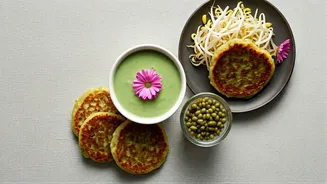Dietary Habits: A Contrast
The first significant distinction lies in dietary habits. Japanese cuisine is often characterized by its emphasis on fresh, seasonal ingredients, including
a high intake of fish rich in omega-3 fatty acids, seaweed, and fermented foods. These components provide crucial nutrients and antioxidants that combat cellular damage and inflammation. In contrast, Indian diets vary widely but often involve higher consumption of processed foods, refined carbohydrates, and saturated fats. While vegetarianism is common in India, the quality and preparation of food significantly impact health outcomes. The Japanese prioritize portion control, which contrasts with the larger portion sizes often observed in Indian dining. Furthermore, the cultural norm of mindful eating, 'Hara Hachi Bu' (eating until 80% full) in Japan, promotes reduced calorie intake and contributes to the avoidance of overeating, fostering longevity. The emphasis on balanced meals in Japan can be seen as a crucial aspect.
Exercise and Activity Levels
Regular physical activity is another critical area where the Japanese excel. Daily routines in Japan often incorporate more walking and movement. This is supported by the prevalence of public transportation, walking to destinations, and the cultural emphasis on physical work. These habits promote cardiovascular health and prevent weight gain, contributing to increased longevity. In contrast, many Indians lead more sedentary lives, with increased reliance on motorized transport and desk-bound jobs. The lack of exercise and higher stress levels can contribute to cardiovascular diseases, obesity, and other health issues. Encouraging activities like yoga, walking, and sports is vital. The integration of movement into daily life through cultural norms and practices greatly influences health outcomes in Japan. In addition, the Japanese population has access to better-maintained public spaces and resources that are easily accessible to encourage a more active lifestyle.
Stress Management Strategies
Stress management techniques play a significant role in determining life expectancy. The Japanese have a culture that deeply values mindfulness, relaxation, and work-life balance. Practices like meditation, 'shinrin-yoku' (forest bathing), and the appreciation of nature are integrated into daily life. This can reduce chronic stress, which is a major contributor to various health problems. In India, stress levels can be high due to demanding work environments, financial concerns, and social pressures. This stress can contribute to a higher incidence of stress-related illnesses like heart disease and diabetes. Practicing yoga, meditation, and developing healthy coping mechanisms are vital in mitigating the impact of stress. The Japanese prioritize creating environments that encourage stress reduction, which is a factor that enhances life expectancy. There is also less emphasis on excessive competition in Japan than in India, which reduces the chance for an individual to experience burnout.
Healthcare and Preventive Measures
Access to quality healthcare and proactive preventive measures are key in enhancing life expectancy. Japan has a well-established healthcare system that emphasizes early detection and treatment of diseases. Regular health check-ups and screenings are common, enabling timely interventions. In contrast, while India has improved its healthcare infrastructure, access and quality vary significantly depending on location and socioeconomic status. Preventive healthcare awareness may be lower in certain regions. The emphasis on early screening for conditions like cancer, diabetes, and cardiovascular diseases is less prevalent than in Japan. Investing in better healthcare infrastructure, promoting health education, and ensuring access to affordable healthcare are crucial steps in India to bridge the gap in life expectancy. Japanese citizens prioritize preventative measures like regular health check-ups to remain healthy for longer.
Social and Cultural Factors
Social and cultural norms significantly impact health and longevity. The Japanese culture emphasizes social cohesion, respect for elders, and strong community support systems. These promote a sense of belonging and reduce isolation, which is vital for mental and physical well-being. Additionally, the Japanese place significant importance on maintaining strong family bonds and intergenerational relationships, providing support and care for the elderly. In India, while family ties are traditionally strong, the rapid urbanization and changing social dynamics can lead to increased social isolation and a weaker support network for the elderly. Additionally, lifestyle choices of younger individuals can significantly impact health in later years. The emphasis on healthy living and community support systems in Japan contributes significantly to a longer lifespan. The Japanese have also implemented policies that facilitate easy access to resources for elderly individuals to help maintain a healthy social life.














